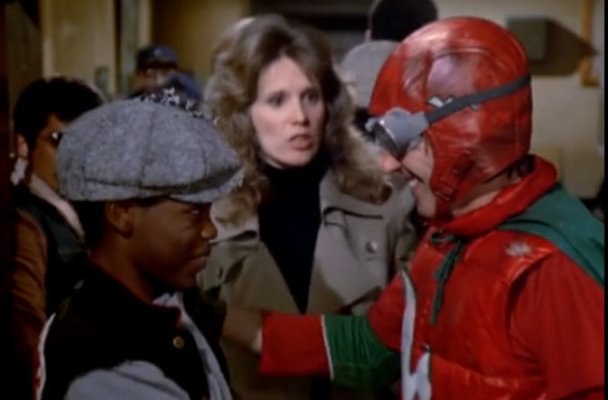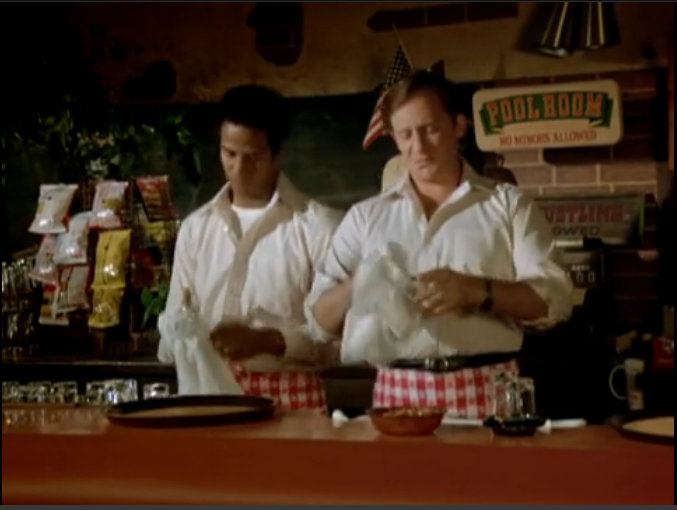Hill Street Blues
Season 2, Episodes 10 and 11: “The Spy Who Came in from Delgado” and “Freedom’s Last Stand”
Original airdates: Jan. 21, 1982 and Jan. 28, 1982
Previously on Hill Street Blues: Belker’s investigations faced continual interruptions from a costumed man who went by the name Captain Freedom, taking it upon himself to clean up the streets.
Frank found himself entangled in a political power struggle and underwent intense scrutiny during a grand jury investigation. Meanwhile, Renko and Bobby found themselves mired in a comedic C-story subplot.
We’ve now crossed the midway point of the second season of Hill Street Blues. I appreciate those of you who have been reading and sharing these articles. I genuinely enjoy crafting them.
In my reviews of both the first and second seasons of Hill Street Blues, I’ve commended the show’s utilization of serialized storytelling, an approach that was rather pioneering at the time (and still remains somewhat unique in the realm of cop shows).
Hill Street‘s commitment to serialization had a profound influence on the television landscape as a whole, and many consider the show to be one of if not the progenitor of the storytelling style that we’ve all come to adore in contemporary television.
Certainly, just as with all serialized narratives, once Hill Street Blues commits to a particular ongoing storyline, there’s often no easy way out.
Many of you probably remember the debates among critics and fans regarding the mid-story alterations made by Damon Lindelof and Carlton Cuse in Lost, especially during season three.
It’s clear that breaking away from a storyline that isn’t working isn’t a straightforward task. I don’t intend to downplay the past, but I can only imagine that these challenges were even more daunting in earlier times when audience feedback was slower, less accessible, and not as prominent, and when producers couldn’t easily engage with viewers or critical input.
Many episodes were—and still are—crafted in isolation, which prevents contemporary staff from being overly influenced by audience reactions.

Yet, as a viewer, serialized storytelling can be capricious. When it’s good, it’s exceptionally good—so good that you’re left craving more immediately, akin to Skinny Pete on Blue Meth.
However, when it’s subpar, few things are more exasperating than enduring an ongoing story within a serialized show that falls flat. At times, it feels as if the interminable story will never conclude or that certain characters will never exit the scene.
We can alleviate this frustration by binge-watching shows on DVD or via various streaming platforms, but eradicating it completely proves to be nearly impossible.
In the midst of its second season, Hill Street Blues encapsulates both the exhilaration and vexation associated with serialized storytelling.
Despite featuring shorter one- to two-episode arcs throughout the season, this midsection is primarily driven by two major narratives: Captain Freedom’s mission to cleanse the streets and Frank’s endeavors to simultaneously survive and thwart the political maneuvering of the Sullivan Commission grand jury.
Also Read: Review: Hill Street Blues, “Blood Money” and “The Last White Man on East Ferry Avenue”
If you read my previous review, you can probably surmise my feelings about both stories. One is intricate, well-plotted, and embodies the elements that HSB excels at—somewhat complex adult tales with a hint of political or socioeconomic depth—while the other revolves around a buffoon pretending to be a superhero and failing miserably.
Captain Freedom makes two additional appearances in these episodes and any semblance of charm the character had (which was next to none) is completely eroded.
As I mentioned in last week’s review, the concept of a man attempting to take matters into his own hands and drawing inspiration from superheroes is intriguing. However, the execution of each of Captain Freedom’s appearances is feeble and one-dimensional.
I don’t want to dwell on the tonal inconsistency for too long, but it’s hard to ignore that the character might have succeeded had he been given more substantial development or rooted a bit more in reality.
Instead, Freedom reappears in “Delgado” and, once again, naively and ignorantly assumes Belker needs assistance, only to be harshly rebuffed.
This sequence is almost a repetition of what occurred in the previous episode, and it’s even more of a letdown because Belker’s advice seems to be falling on deaf ears.
I understand the basic point of Freedom’s character. He’s naive and believes he can save people by prancing around in a ludicrous costume.
Ultimately, this leads to his downfall, as “Freedom’s Last Stand” portrays the character recklessly inserting himself into a perilous shootout, only to be fatally shot because he is entirely unprepared for the reality of criminals shooting back.
I suppose the whole arc is intended to illustrate how Freedom’s well-intentioned but uninformed desire to do good results in his demise, perhaps echoing the show’s overarching theme of what it takes to be a cop on these challenging streets.
Maybe in future episodes, Freedom’s death will have a profound impact on Belker (I hope it does), and perhaps that impact will tie into the aforementioned themes.
Nevertheless, if the character is set to make four significant appearances and undergo a slow-motion death scene laden with dramatic weight, the writers should have put more effort into diversifying those appearances or, at the very least, making his death meaningful in some way.
Serialization works when stories evolve over time, leading to a satisfying resolution. Freedom’s “arc” had minimal development, and the conclusion was far from satisfying.
Live-action superhero stories faced challenges in the early 1980s, and it’s conceivable that Bochco and his team struggled with integrating such a character into the show’s world. I have no qualms with quirky superheroes, and I don’t expect them all to be dark and gritty in a Nolan-esque fashion.
Even a few additional details explaining why Freedom took these actions could have significantly enhanced this storyline.
The repetitive nature of Freedom’s scenes, coupled with the character’s comical execution, led to an unsatisfactory storyline that regrettably occupied a significant portion of the last four episodes.
While I applaud the show’s willingness to experiment with something rather unconventional and outside the typical cop show formula, it simply didn’t succeed. The aftermath may prove to be stronger, and I acknowledge that I reserve the right to change my opinion, of course.
Nevertheless, I have my doubts about that. Watching those episodes in quick succession helped alleviate the discomfort caused by the abundance of Freedom scenes. I can’t help but wonder how much I would have groaned if I had watched Hill Street Blues on a weekly basis two decades ago.
Thankfully, this pair of episodes benefited from the compelling Sullivan Commission storyline, which aligns more with the strengths of Hill Street.
Instead of repeating the same narrative beats like the Freedom storyline, this one unfolds in a logical and engaging manner.
Frustrated by the grand jury’s ambush, Frank takes an offensive stance in a bid to shield the Hill from corruption charges and put an end to the political intrigue he’s been ensnared in.
Unfortunately for Frank, Chief Daniels continues to be deviously secretive. Daniels sends an attractive officer undercover at the Hill, posing as a flirtatious yet ineffective file clerk. The way the men react to her is, honestly, quite unpleasant.
She discovers that Frank and his team have been utilizing the enigmatic Delgado as a “paper” cop, logging hours and arrests for him even though he isn’t physically present.
Throughout “The Spy Who Came in from Delgado,” Frank grapples with his decision to keep Delgado “working” after burnout led to the loss of his sanity and his pension track after 19.5 years of service.
Frank is undeniably a morally principled individual who takes his job seriously, but this storyline effectively highlights the ethical gray areas that law enforcement officers may encounter.
Keeping Delgado on the books may provide a deserving officer with his rightful recognition, yet it’s entirely illegal and, frankly, corrupt. Frank appears uncertain about how to reconcile what is “morally right” with what is “legally right.”
In “Freedom’s Last Stand,” Frank’s internal struggle materializes in more visible ways. He reassures Delgado that he won’t lose his position or his earnings, and he reprimands Phil for promoting the inter-agency poker match amidst the extensive corruption investigation.
When Frank finally faces the grand jury, he’s prepared to defend his beliefs, regardless of the consequences.
He staunchly upholds his decision to retain Delgado on the payroll, refuses to throw colleagues from other districts under the bus, and eventually surrenders his gun and badge to Daniels.
Unfazed by Frank’s outbursts, Daniels declines to accept Frank’s resignation (Frank’s inside knowledge about Daniels’ manipulative tactics certainly doesn’t help).
Ultimately, Frank comes to the realization that he never truly wanted to quit but had contemplated it, and he had always aimed to safeguard Delgado’s pension (which he successfully accomplished).
This storyline exemplifies how to approach serialization, even in a brief burst, by effectively intertwining plot and character development.
The Sullivan Commission narrative presented clear stakes (Frank could secure promotion but potentially lose his job based on his decisions) and, more crucially, incited a character to take action, allowing us to delve deeper into his personality.
While we knew that Frank would advocate for his officers, this arc demonstrated the extent to which he’d go while prompting him to question his own principles along the way.
Overall, it further established Frank as the unwavering moral core of a sometimes corrupt universe within the show, revealing his willingness to cross legal boundaries when deemed necessary.
Additionally, we gained insight into Daniels, Division, and the broader political structure within the department. It’s a case of straightforward yet effective storytelling. When serialization is executed correctly, it can be as compelling as this.

Other Thoughts:
- In a brief but exemplary demonstration of quality serialization, both of these episodes feature an engaging undercover operation in which Belker, Bobby, and Renko venture into the restaurant business as part of the corruption angle Daniels initially proposed before betraying Frank. I’m curious about Frank’s rationale for selecting the undercover team, particularly since LaRue and Washington were excluded, and Bobby and Renko, who are uniformed officers, were chosen. Nevertheless, the operation goes awry when several men attempt to rob the establishment, resulting in a shoot-out (the same incident where Freedom meets his demise). It’s worth noting that the show employs slow motion whenever intense shoot-outs occur, reflecting the style of the era.
- Shifting the focus to undercover operations, Goldblume embarks on one himself, venturing onto the streets while dressed in drag. An encounter with a criminal who attempts to snatch his purse leads to a chaotic altercation. Despite taking a beating to his face, Goldblume appears revitalized by the fight. This is an intriguing development that I’ll continue to monitor.
- The representative from the Hill in that semi-secret poker game? Lucy Bates. She narrowly loses, and Joe seizes the chance to offer some physical comfort and an attempted kiss. Predictably, the interaction does not go well. I appreciate how their relationship is unfolding: methodical, realistic, and charming, with gradual additions of new layers every week or two. Once more, it’s a testament to solid long-term characterization.
- This Week in Phil’s Sexual Exploits: A Brief Reappearance! The undercover cop/file clerk spends a significant amount of time casting admiring glances in Phil’s direction. Phil playfully teases her about falling for him, as it appears to be a recurring theme. It’s an entertaining dynamic featuring Michael Conrad.
- This Week in Roll Call Gags: Not much to delve into, really. It primarily comprises Phil’s continuation of making oddly sexist jokes about different female officers. This recurring pattern raises concern and may eventually lead to a significant storyline, doesn’t it? It must be another facet of long-term serialized storytelling. Please.

